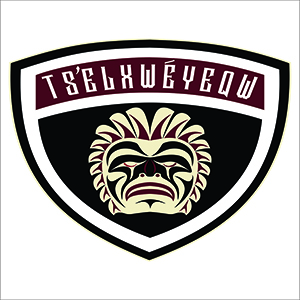The Chilliwack Chiefs will take to the ice at the RBC Cup wearing a unique jersey emblazoned with a logo designed by a First Nation artist on Thursday night.

The jerseys are a way to highlight the partnership between the BCHL team and First Nations to bring the RBC Cup, Canada’s national Junior A hockey championship, to Chilliwack.

David Jimmie, Chief of Squiala First Nation, president of the Stó:lō Nation Chiefs Council and the Ts’elxwéyeqw Tribe, said he wanted a logo that “pays tribute to the organization of the Chilliwack Chiefs and also pays tribute to our culture and what it means to be a chief.”
Artist Jason Roberts of the Tzeachten First Nation designed the logo, which the team will wear during their final round-robin game at Prospera Centre on Thursday.
It features what Jimmie called a “chief’s carved mask” in the style of the Stó:lō territory. Ts’elxwéyeqw, the region’s traditional name, appears above the mask.
“In our cultural ways, when you wear a mask, and people use it in ceremonies, they become whatever they’re portraying,” Roberts said.
“I figured if it was a mask of a chief, especially if they’re the Chiefs organization, any one of those players that are wearing those jerseys or using that symbol could identify with what a chief portrays — the strength and the respect and the leadership it takes to be a chief.”

Get daily National news
The shoulder crest consists of a maple leaf design Roberts created for Canada 150 celebrations.
Roberts, a sports fan, said he worked hard to find a symbol that represented his community but also worked as a sports logo.
The move came months after the BCHL team “retired” its longtime mascot, Chief Wannawin, which some considered a stereotypical depiction of an Indigenous person complete with headdress and war paint.
Jimmie said he does not want to dwell on Chief Wannawin, choosing instead to focus on his community’s partnership with the team and his community’s co-sponsorship of the tournament.
“My approach was, as the co-chair of the RBC Cup and pitching and building the relationship, that I couldn’t be associated with that mascot,” he said.
“It was a long conversation where you want to do what’s right,” Chiefs head coach and general manager Brian Maloney said of the decision to drop the mascot.
“Times are changing. We felt like we wanted to respect that.
“There is a respect factor on both sides.”
Sports teams across North America have long faced criticism for using names and imagery that critics say reinforce stereotypes about Indigenous people.
The NFL’s Washington Redskins have come under pressure to change their logo and nickname but have so far resisted.
Globalnews.ca coverage of the Cleveland Indians name controversy
Major League Baseball’s Cleveland Indians announced that they will remove the Chief Wahoo logo from their uniform next year.
Alberta Premier Rachel Notley said the Edmonton Eskimos should lead a discussion about changing the CFL team’s nickname.
Many consider the word Eskimo a slur, or at least an uncomfortable vestige of colonialism for Inuit people.
Both Jimmie and Maloney said they hope to provide an example of honest two-way communication between sports teams and Indigenous people, and how it can lead to fruitful partnerships.
“A lot of times you’re seeing more of the bad news stories and that’s what I really wanted to do with this, demonstrate how positive relationships can work well and the outcomes can be quite strong,” Jimmie said.
The game-worn jerseys will be auctioned off after Thursday’s game, with proceeds going to the RBC Cup Legacy Fund.
- With files from The Associated Press and The Canadian Press
- After tragedy, Lapu Lapu victims were victims of ‘snooping’ at hospitals: report
- $10-a-day daycare program paused in order to stabilize, B.C. government says
- Rockslide closes Highway 93 between B.C. and Alberta until at least noon on Thursday
- Tumbler Ridge school portables are for when students, staff ‘are ready’













Comments
Want to discuss? Please read our Commenting Policy first.